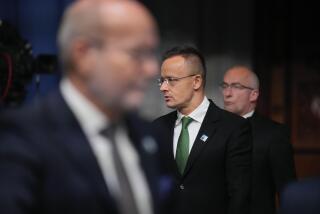Subsidy Crisis Taxes Resolve of European Community
- Share via
BRUSSELS — The European Economic Community is drifting toward a major financial crisis that, unless resolved at this week’s European summit, could cripple the world’s largest trading bloc.
The heads of government of the 12-nation EEC, or Common Market, gather for their regular winter summit Friday and Saturday in Copenhagen.
The summit is intended to review progress in improving European political and economic cooperation and to consider the EEC’s long-term goals. It also gives the leaders a chance to exchange views on global issues, such as the recent turmoil in financial markets and prospects for next week’s U.S.-Soviet summit.
But a mounting budget crisis within the EEC threatens to reduce the Copenhagen meeting to a narrow debate about spending and taxing.
“If we can’t get our act together in Copenhagen, I fear the image of Europe will suffer,” Lord Plumb, president of the European Parliament, said last week.
Leo Tindemans, the Belgian foreign minister, was more blunt.
“If the Copenhagen summit should result in failure, Europe will be paralyzed for many years,” he said.
The collapse of two successive meetings of EEC farm ministers has put a spotlight on the key issue plaguing the community: how to limit farm subsidies.
Sir Geoffrey Howe, Britain’s foreign secretary, warned in Brussels last week that without agreement on that issue, there will be no settlement in Copenhagen of the EEC’s overall budget problems.
The community spends about two-thirds of its total budget on farm programs. Nearly a fifth is for storing and destroying food surpluses created by farm subsidies.
At Britain’s insistence, the EEC has been trying to agree on radical reforms in its farm-spending policy that would put specific limits on the amount of subsidies paid to producers.
Most members say a change is needed, but they disagree on how to do it.
British Prime Minister Margaret Thatcher said last month she would accept nothing less than an “unbreakable guarantee” by all member countries to strictly limit farm spending.
Without such commitments, she said, Britain would not accept a proposal by the community’s executive commission to fundamentally change the way in which the EEC raises its money.
The other EEC nations are France, West Germany, Italy, Luxembourg, Belgium, Netherlands, Denmark, Greece, Ireland, Portugal, and Spain.
A radical overhaul of the organization’s financing system is crucial because the community already is living beyond its legal means and has no budget ready to implement at the start of next year.
For the first time in its history, the EEC effectively suspended budget talks earlier this fall because of conflicts over the farm spending issue.
Under current rules, the European Community is limited to raising $44 billion for 1988, yet it already is committed to spending at least $51 billion.
The community is legally prevented from borrowing money through the sale of securities, the way national governments do. If no budget is in place next year, the EEC will have to operate on a month-by-month emergency basis, with spending limited to 1987 levels.
More to Read
Sign up for Essential California
The most important California stories and recommendations in your inbox every morning.
You may occasionally receive promotional content from the Los Angeles Times.










